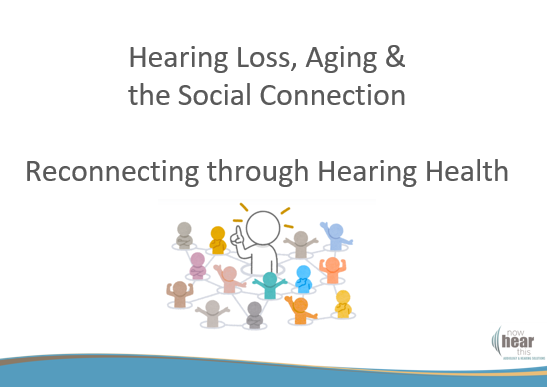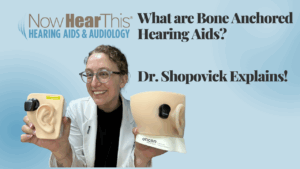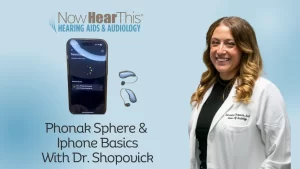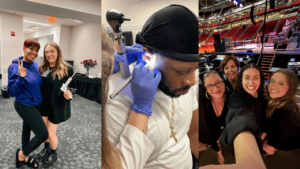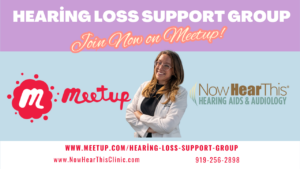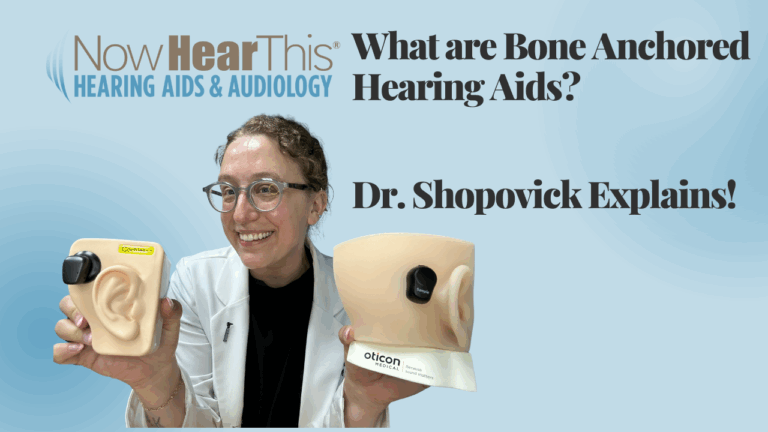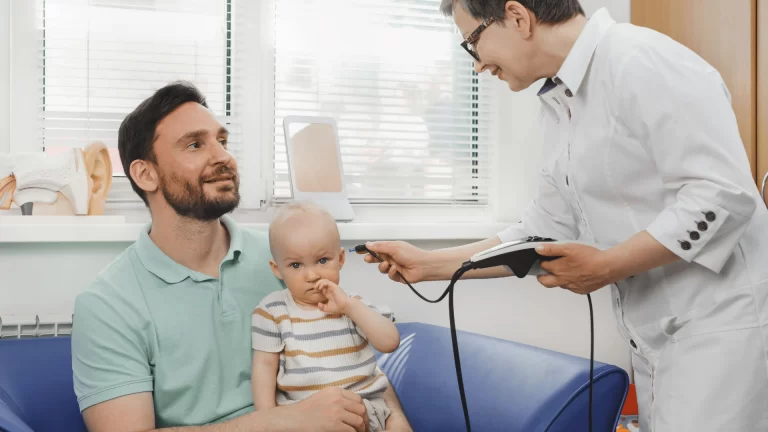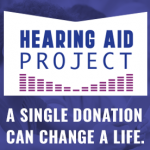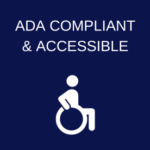Presented by Dr. Egan
Staying socially connected is a vital part of living a full and healthy life, and for many, hearing loss can quietly chip away at that connection over time. In this recent patient webinar, Dr. Egan explores the powerful relationship between hearing, aging, and our emotional and cognitive well-being, and shares practical ways to protect your hearing health while staying fully engaged with the people you love.
The Human Need for Social Connection
Humans are wired to connect. Our social networks provide us with emotional support, mental stimulation, and a greater sense of purpose. When that connection fades, it can negatively affect both our mental and physical health.
Unfortunately, hearing loss is one of the often-overlooked factors that can lead to social disconnection. Many patients describe feeling isolated even when surrounded by others, unable to fully engage in conversations or group activities.
This type of social isolation isn’t simply unpleasant, studies show that its health impact can be severe. In fact, the U.S. Surgeon General has compared the health risks of chronic loneliness to smoking 15 cigarettes per day.
How Hearing Loss Contributes to Social Isolation
As we age, multiple factors can make social connection harder:
- The loss of loved ones
- Changes in mobility or living circumstances
- And for many — progressive hearing loss.
Even mild hearing loss can interfere with conversations in noisy settings, phone calls with family, or even simple interactions in restaurants or public spaces. The frustration of missing words or constantly asking others to repeat themselves often leads people to slowly withdraw from social situations.
This creates a “snowball effect”:
- Hearing loss causes communication breakdowns
- Which leads to social withdrawal
- Which increases isolation and emotional distress
- Which negatively affects long-term brain and physical health
The Research Is Clear – Hearing Loss Impacts More Than Just Your Ears
Multiple international studies consistently show:
- Hearing loss is directly linked to smaller social networks and feelings of loneliness.
- The degree of hearing loss (mild, moderate, severe) doesn’t change the risk, even mild loss can create major social barriers.
- Untreated hearing loss contributes to higher rates of anxiety, depression, cognitive decline, and dementia.
- Early treatment, such as hearing aids or implantable devices, can significantly reduce these risks and restore social engagement.
Auditory Wellness: It’s More Than Just Hearing
Hearing health is about more than whether you can detect sounds. Auditory wellness means being able to fully participate in conversations, appreciate music, catch emotional nuance in voices, and stay present in your environment.
When you struggle to understand soft consonants or follow group conversations, it leads to breakdowns in communication, misunderstandings, and missed opportunities for social connection. And the emotional frustration can quietly reduce your motivation to engage socially.
Practical Steps to Reconnect
The good news is that hearing loss, and its impact on your social world, is highly treatable. Dr. Egan recommends several steps patients can take:
1. Check In With Your Emotions
Be mindful of how hearing challenges may be affecting your mood and social engagement. Self-awareness helps motivate action.
2. Evaluate Your Social Circles
Consider:
- Who do you talk to daily, weekly, or monthly?
- Are there people you’d like to connect with more?
- Are certain voices or environments harder to hear?
- Who could you reach out to for more consistent contact?
3. Create Social Routines
Schedule regular visits, phone calls, or coffee outings with those you’d like to stay connected with. Consider joining new groups, hobbies, or volunteer organizations that fit your interests.
4. Set Hearing Goals
During your audiology visits, share specific listening challenges. This allows your provider to fine-tune your hearing technology and offer targeted strategies for real-life situations.
5. Keep Your Technology Current
Ensure your hearing aids are up-to-date with:
- Recent hearing tests
- Speech-in-noise testing
- Firmware updates
- Regular maintenance
Even subtle adjustments can make a major difference in your ability to hear in noisy environments like restaurants or gatherings.
6. Join Support Networks
Community support is powerful. Now Hear This offers a Hearing Loss Support Group that meets regularly. Activities like nature strolls or social meetups provide opportunities to practice listening skills and build community.
Small Changes Can Protect Your Long-Term Health
Perhaps most importantly, treating hearing loss early may reduce your long-term dementia risk, according to significant research from Johns Hopkins and other studies. Social connection protects not only your emotional health, but your brain as well.
As Dr. Egan beautifully says: “A good audiologist might not add years to your life, but they can add life to your years.”
Take Action Today
If you or someone you care about is struggling with hearing loss or withdrawing from social activities, don’t wait.
- Schedule a comprehensive hearing evaluation.
- Set specific goals for your social and hearing wellness.
- Stay engaged, stay connected, and protect both your hearing and your overall well-being.
Full Transcript of the Webinar
For reference, the full transcript of Dr. Egan’s presentation is available below:
“Welcome welcome welcome to our annual established patient webinar! I am so excited to still be doing this with you guys, and thank you so much for being one of our amazing patients. Let’s get going—if it’ll let me—there we go! Always got to give the quick disclaimer: this presentation is for information only; this does not substitute for personalized medical care and treatment. Obviously, if you have a very specific question, you know that would be something you’d schedule—um—schedule an appointment for or shoot us an email. And another quick housekeeping reminder to mute your microphone during the presentation, and then if you have a question, feel free to enter it into the chat and I’ll go over all the questions in the chat at the end of the presentation. Thank you!
About me—I recognize quite a few of the names in this chat, but some of them are just usernames, so if I haven’t met you, I’m Dr. Egan. I am one of the audiologists at Now Hear This ©. Although I’m not actively seeing patients right now, I’m doing some work-from-home stuff while I am very busy with my five-month-old son. So it’s great to still be connected to the hearing community and connected to the Now Hear This © family because I just love working with you guys. Here’s the baby update—I knew people would be asking—so this is Francis. He was born in December, so he is five months, and he is so much fun! But I am just learning constantly all the different little things about babies, so if you do have any tips, feel free to send them my way.
And just a huge thank you again for voting us Raleigh’s best the fourth year in a row—every year this happens we are just beyond, uh, belief that you guys have voted for us and got this job done, and I think the voting starts again this July. So thank you thank you thank you from the bottoms of our hearts—we’re just so appreciative of you guys and that’s why it’s so fun to celebrate Better Speech and Hearing Month and give back as much as we can.
Okay, so today we are going to be talking about hearing loss, aging, and the social connection—reconnecting through our hearing health. What you will learn today: why social connection is vital to your health, how hearing loss affects our relationships, tools to help you reconnect with others, and tips to get the most out of your hearing healthcare. Why does it matter to be connected to other people? Let’s just start with the basics—humans are wired to be social creatures. Loneliness can affect your brain and your body, and strong social networks improve our health and our happiness. A lack of social connections—my Zoom is cutting me off here—what is social disconnection? A lack of social connections or a lack of social network. It’s a mix of loneliness and isolation, and you can feel lonely even when you’re with other people. And of course, if you’ve ever had hearing loss, you know what that’s like—to be surrounded by a ton of people and to not know what’s going on. And so all of these factors kind of overlap with each other.
This problem is not new—almost 200 years ago a social researcher, Harriet Martineau, wrote about four social challenges with hearing loss, and those four were stigma of hearing loss, lack of support from healthcare providers, musical enjoyment, and avoiding people. And unfortunately, it’s not 1834 anymore—it’s many, many years later—and we’re still working through these problems. But the good news is, there are a lot more tools in our toolkit to work on them together.
So let’s talk more about this crisis of connectedness. Today, one in five Americans feels isolated from one another. This social disconnect is the equivalent of smoking 15 cigarettes a day. So the U.S. Surgeon General said social disconnection is so bad for our health, it’s like you’re smoking that many cigarettes. Social disconnection is an urgent public health problem for all age groups, with or without hearing loss—young, old, you name it. A lot of people are feeling more disconnected than ever before, and so it’s kind of a snowball problem if you think about it. Social connectedness and age—because we’re more likely to experience social isolation with age—there are lots of factors that go into that, right? Possibly losing a spouse, losing loved ones, our social circle gets smaller, we might have more mobility issues making it harder to get to things. We’re more likely to experience social isolation if we have hearing loss—that makes sense, right? If you can’t hear what’s going on, we can’t engage on the same level—and we’re more likely to experience hearing loss with age. So all three of those things kind of roll into one big snowball of social isolation that’s just rolling down the hill. And it’s definitely an uphill battle at times to figure that out.
That snowball effect continues if you think about it—the negative effects of shrinking social circles, increased frustration—they can also cause anxiety and depression. So this starts out as a physical problem—we have a gradually onset hearing loss—it turns psychological because we become fatigued and frustrated in those social events, which makes us withdraw and socially isolate, and then it becomes a social issue of loneliness, which, if you loop back, also becomes a physical issue with it being harmful to our health—the smoking of 15 cigarettes a day. There’s so much research to back this up, and I didn’t want to make this presentation too boring, so I just have two slides to highlight some of the many, many studies, but a recent systemic review showed that hearing loss is associated with loneliness and social isolation, and another review indicated hearing loss is associated with both social isolation and loneliness. This association is unrelated to the degree of hearing loss, and I thought that was really interesting. So be it mild, moderate, severe, or profound—whatever your configuration is of hearing loss—they found that all those people still found that they struggled with the social isolation. And you know, that’s really noteworthy because a lot of folks who have mild hearing loss don’t want to do anything about it, even though it’s still affecting them and still causing that social isolation.
There’s even more research—recently in the United States they found that hearing problems were associated with weaker and smaller social networks; in Japan they found that loneliness may accelerate the incidence of disability in older adults with hearing loss; and in Australia, those with self-reported hearing loss reported significantly smaller and less supportive social networks compared to those with normal hearing or corrected hearing loss. Now that one is really interesting because it’s basically saying if you don’t do anything about your hearing loss, you’re going to have problems. But the group that did get treated—be it a cochlear implant, a surgically implanted device, or a hearing aid—that their social isolation then was less of an issue. Now let’s talk about, of course, that ever-present risk factor for dementia. There’s another snowball effect here: hearing loss is a risk factor for dementia, social isolation is a risk factor for dementia, but if hearing loss is treated and if one stays socially active, that risk for dementia is removed. And this comes from a large study from Johns Hopkins over many, many years about those risk factors for dementia and what can be prevented. And that’s the key thing here—this can be treated. These risk factors go away if we do something about it. So that’s kind of a positive to look at there.
What is auditory wellness? Auditory wellness refers to the overall health and functionality of our ears and auditory system. So it encompasses not only the ability to hear but also the quality of what we hear. It involves effectively processing sound to enable full participation in daily activities without limitations. Auditory wellness is good quality of life in regards to hearing. So if you think about it, things that would make our auditory wellness better: when we can understand speech, when we can understand it in really difficult listening environments, when we can enjoy music, when we recognize emotions and small nuances in people’s voices, when we can locate where sound is coming from. So conversely, auditory wellness declines when we can’t hear in that restaurant, when we can’t understand the lyrics to the song in our car, when we miss out on those little tweaks and notes in a joke, and when our phone rings and we can’t find where it is in the house. All those things decrease that hearing quality of life.
Here’s an example: “Have you talked to Faith?” someone might say, and then someone might respond back, “Yes, I washed my face.” And there are all sorts of cartoons and jokes about this, and it can be humorous at times, but really it’s a meaningful example of miscommunication due to hearing loss resulting in decreased auditory wellness. And those soft, high-frequency consonants of speech that are just so commonly lost as we continue to live cause these communication breakdowns. And when these communication breakdowns happen, it’s uncomfortable—like we can joke about it—but at the end of the day, it’s uncomfortable, and it might make someone less likely to engage the next time.
The evidence is clear—studies from so many different organizations all find the same things: folks who have hearing loss are at risk for smaller social networks, are at risk for increased loneliness, and an increased dementia risk factor. So now we’re going to focus on the positive—what can be done about it and how do you reduce those risk factors? We’re going to talk about checking in with our emotions, considering our different social networks, adding someone in from the waiting room (one moment), how to reach our modified hearing goals, and how to make sure our hearing technology is optimized.
Emotions—I know that’s kind of a cliché thing to talk about in this day and age—to take time to reflect, journal, check in with yourself—but honestly, it is a really important thing. It’s really important to have that self-awareness of our emotions to empower us to make behavioral change. I don’t know about you guys, but there have definitely been moments where I needed someone to point out that I was walking around with a cloud over my head before I realized that I was doing it. So you know, it does take us a moment or two to go, “Oh yeah, like why am I feeling frustrated, why am I feeling angry?” And so taking the time to check in on those things so that we can then make behavioral changes is going to be an important part of making us stay socially active.
Another part to consider is our social network. So this graphic here has several different layers—family, friends, acquaintances—take time to reflect on: who do you talk to on a daily basis, on a weekly basis, on a monthly basis, who do you see just a few times a year, who are people that you hear well, what are situations that you still struggle in, and are there people who are on any of these layers that you wish you could bring into a closer circle and see more often, but you just don’t feel like you hear them well enough—and that’s something that’s keeping you from staying socially engaged. So once you take time to reflect on that, figure out which relationships do I want to strengthen. Is it this person from book club that I really click with but it’s hard to hear in that setting? Is it a neighbor or a family member that just has a very high-pitched voice or someone who mumbles? Think about how you can communicate with them regularly. By trying to stay in touch with those people at consistent intervals, it’s going to be easier to maintain. Schedule regular visits in person—if there’s that one person at your book club that you struggle to hear, you know, you can always say, “I love talking to you but it’s always really noisy here, do you also want to get coffee once a month?” or something like that. Find those shared activities to bond over because that will also make it easier to make this a habit and make it a change to your social circle. On the flip side, say all the people that you have you see on a regular basis—but it’s not a lot—what are those new social connections that could help expand your social circle? Join clubs and groups that align with your interests. And this, I feel like because of technology, has become easier in some ways and harder in others. If you’re not super tech-savvy, it can be harder to find a group to meet up with because so many groups are now created online. Consider your activities, your interests, consider volunteering—you know, so that you meet people but you also have that bonded sense of higher purpose. A lot of things post-pandemic are available in communities that weren’t available for a couple years, so it can be kind of nice to rebranch out after those things. And then of course, for some people it’s just the process of getting out more, because if you get too comfortable staying at home, you’re only going to talk to the people under your roof. So even if you can’t find a club or a group or whatever, just get out of your house—you’re going to socially connect with more people.
Now we’re going to switch gears and focus on modified hearing goals. Once you check in with your emotions, consider your social groups—think about who you’d like to connect with more or what new people you might want to meet. Work with your audiologist to turn these into specific hearing goals. So when Dr. Shopovick asks, “How have you been hearing? How are you doing?” resist the urge to respond with a quick “I’m good, how are you?” Instead, share the details that really matter—like struggling to hear your grandchildren on the phone or wanting to follow conversations better in restaurants. Sharing those specifics helps your audiologist track your progress, provide more targeted strategies, and ensure you’re getting the best care possible. Empower yourself by asking whether you feel confident in your hearing abilities across different situations. Try setting one small goal each month to enhance your social engagement and rebuild confidence and joy. And if your social circles are already strong, think about who else might benefit from these tools—maybe someone you know is withdrawing socially, and you could help them become more engaged. This webinar is also about giving back and supporting others.
On that note, consider joining our hearing loss support group on Meetup, an idea started by Dr. Shopovick. The group meets monthly, and while I haven’t been able to attend yet because of my child’s nap schedule, it’s a great way to connect with others who understand your journey. Our next event is a garden stroll and social at the North Carolina Botanical Garden on Sunday, June 15th—a wonderful opportunity to enjoy nature and connect with others.
Also, don’t forget to keep your technology up to date. Your hearing aids may have been programmed with real-ear measurements years ago, but if you haven’t had a recent hearing test or reprogramming, it’s time to get checked. Make sure your hearing aids have had speech-in-noise testing and receive regular maintenance. Firmware updates are becoming increasingly necessary and usually need to be done in the clinic—if you haven’t had one, you might be missing out on significant improvements in challenging environments like restaurants or concerts. Remember, hearing aids can help, but they aren’t a complete solution. About 75% of people see improvement with properly programmed hearing aids, but the remaining 25% may still struggle with social connection, which is why ongoing care is so critical. Holistic hearing healthcare is about more than devices—it’s about relationships, social listening goals, and improving quality of life. For example, if someone says they can’t hear well at Panera, I immediately consider the layout and seating and tailor recommendations accordingly.
A colleague once said a good audiologist might not add years to your life, but they can add life to your years, and that’s what drives us. So think about what you can do today to live more socially engaged and less isolated. Make sure you’ve had a full hearing evaluation, including a detailed social history and speech-in-noise testing. If it’s been years since your last exam, now’s the time. Evaluate your social network—can you deepen existing relationships or build new ones? Follow up with your audiologist regularly for personalized care. Social connection is vital to your health and happiness.
We’ve talked today about the link between hearing and overall health, and about how social isolation can snowball into serious consequences like dementia. If you or someone you know is withdrawing due to hearing loss, take action. Create routines and find common activities to stay engaged. Regular self-check-ins and adjustments are key to maintaining a full, connected life. Alrighty, I’m ready for questions—feel free to ask them in the chat.”

